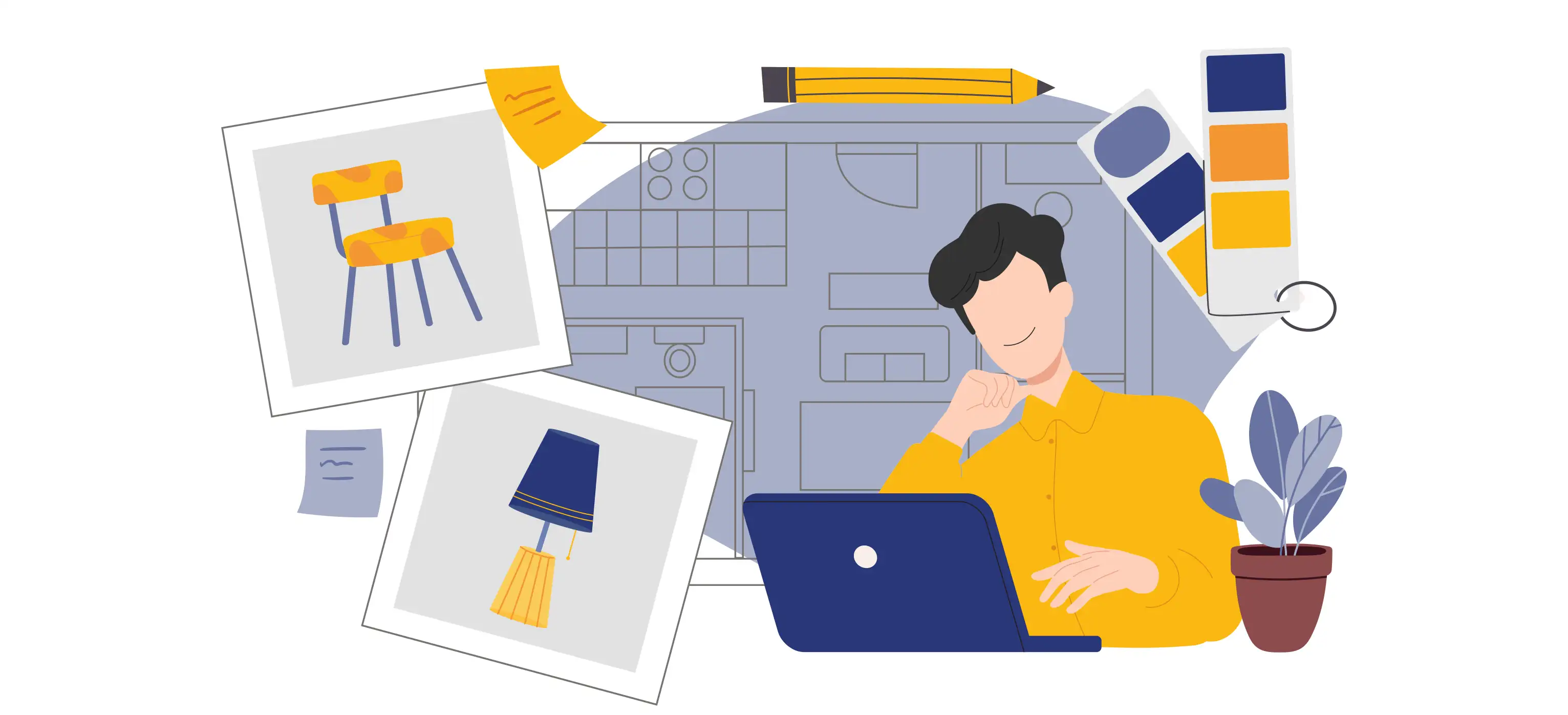 Ghanashyambhai Bhagvanbhai Vaghani
Oct 15, 2025
Ghanashyambhai Bhagvanbhai Vaghani
Oct 15, 2025

Embark on a transformative journey into the captivating realm of interior design. Beyond mere decoration, interior design shapes the very spaces we inhabit, influencing emotions and interactions. In a world where aesthetics meet functionality, the demand for skilled designers is soaring.
This blog unravels the myriad benefits of interior designing courses, from honing creative prowess and technical skills to unlocking a world of professional opportunities. Join us as we explore the art and science behind crafting environments that inspire and enhance the human experience.
Check out: Top Skills to be an Interior Designer
Pursuing an interior design course is more than a commitment to learning the principles of aesthetics and spatial arrangement. It's an immersive experience that unlocks a realm of creativity, technical proficiency, and professional opportunities.
Let's delve into the transformative benefits of enrolling in an interior design program, illustrated through real-world examples. Here are the top Benefits of pursuing Interior Designing Course;
One of the primary advantages of pursuing an interior design course lies in unleashing and honing one's creative prowess. Designing interiors is not merely about arranging furniture or choosing color palettes; it is an art form that demands innovative thinking and a keen eye for detail. By engaging in coursework that encourages creativity, aspiring designers learn to conceptualize and implement unique design ideas. This training cultivates a distinct design style, allowing individuals to express themselves artistically in the spaces they create.
For instance, a well-known interior designer might draw inspiration from cultural elements, historical periods, or even personal experiences to craft spaces that tell a story. The ability to translate abstract concepts into tangible, aesthetically pleasing designs is a skill honed through dedicated education in interior design.
Read Also : Top Tips to Land a Job in the Interior Design Industry in Sydney
The demand for skilled interior designers continues to rise across various industries, ranging from residential and commercial spaces to hospitality and retail. The second benefit of an interior design course is that it provides an individual a competitive edge in the job market. Beyond the aesthetic appeal of spaces, interior designers contribute significantly to functionality, efficiency, and user experience.
Consider the hospitality industry, where interior designers play a crucial role in creating immersive and memorable guest experiences. Hotels, restaurants, and resorts seek professionals who can blend design aesthetics with practical considerations, resulting in spaces that not only look appealing but also cater to the needs of their clientele.
Read Also : A Beginner’s Guide to Starting an Interior Design Career in Sydney
An interior design course equips individuals with the technical skills required to bring their creative visions to life. From mastering design software to learning the art of drafting and 3D modeling, students develop a comprehensive toolkit for professional design presentations. Technical proficiency is paramount in today's design landscape, where visualizations and digital representations play a pivotal role in communicating design concepts to clients, contractors, and collaborators.
For instance, a designer working on a commercial project may use 3D modeling software to provide clients with realistic renderings of proposed designs. This not only enhances client understanding but also streamlines the decision-making process, fostering effective communication between designers and stakeholders.
Find out the Top Design Software for Architects
Interior design courses often offer a window into the industry, providing students with valuable insights into current trends, emerging technologies, and best practices. Engaging with experienced faculty and industry professionals during coursework fosters a network that can be invaluable in one's career journey. Networking opportunities may include guest lectures, workshops, and collaborative projects, allowing students to connect with peers and mentors who share a passion for design.
For example, a student attending a design workshop may have the chance to interact with a seasoned designer known for innovative approaches. This connection can lead to mentorship, internship opportunities, or collaborations that enrich the student's learning experience and contribute to their professional growth.
Beyond the tangible skills acquired, pursuing an interior design course fosters personal and professional growth. Designers are not merely decorators; they are problem-solvers, critical thinkers, and visionaries. Through coursework, individuals learn to navigate challenges, think analytically about spatial configurations, and balance aesthetic preferences with practical considerations.
Consider a residential interior designer tasked with transforming a small apartment into a functional and visually appealing living space. The designer must consider factors such as the client's lifestyle, budget constraints, and the spatial limitations of the apartment. This holistic approach to problem-solving and decision-making contributes to the designer's personal and professional development.
You may like to know: Best Designing Institutes in India
In conclusion, the benefits interior designing course extend far beyond the acquisition of technical skills. From unlocking creativity and securing in-demand career opportunities to fostering industry insights, networking, and personal growth, the transformative potential of interior design education is immense. As individuals immerse themselves in the world of design, they not only shape spaces but also cultivate a unique blend of artistic expression and practical expertise that can leave a lasting impact on the built environment.
Read More: Careers After Diploma in Interior Design

Graphic & 3D Visualization Trainer
Ghanashyambhai Bhagvanbhai Vaghani is a Graphic & 3D Visualization Trainer with over 15 years of training experience. His expertise spans multiple disciplines, including interior design, graphic design, 3Ds Max and UI/UX development. Ghanashyambhai is an Adobe Creative Suite Specialist with expertise in Photoshop, Illustrator, InDesign, Premiere Pro, After Effects, and Blender. He is also a highly sought-after corporate trainer with exceptional skills in digital content creation and architectural visualization. During his career, he has guided over 5,000 students through professional design education.
He holds a Diploma in Animation and Visual Effects from Frameboxx India and has served as faculty at prestigious institutions, including IIFT and IDT India. His experience with E Train India has further refined his ability to deliver effective technical training. Ghanashyambhai employs a practical, project-based teaching methodology. His approach combines technical training with real-world applications.